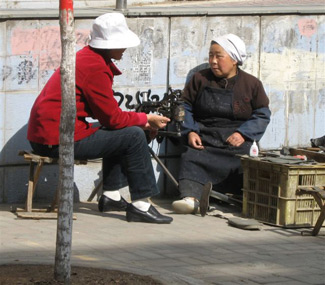With all the excitement of Beijing being at the center of the world stage by hosting the 2008 Olympics, it may be easy to overlook the question of what is happening to the city’s poor in the run-up to the games.
Forced Evictions
Since the Olympics were awarded to Beijing in 2001, there has been a boom in construction in the capital of a country that was already rapidly developing and urbanizing. With construction of the new has come much demolition of the old. In 2004, Human Rights Watch (HRW) issued a report called “Demolition: Forced Evictions and the Tenants’ Rights Movement in China.” The report covered all of China, but highlighted how the Olympics, with its accompanying surge in demolition and construction, has brought an increase in the problem of forced evictions. In a December 2007 report, the Center on Housing Rights and Evictions (COHRE) said that an estimated 1.5 million people have been displaced because of preparation for the games.
|
|
According to the HRW report, some evictions have been violent. Compensation can often be far below market value, and there are cases of compensation funds being embezzled. Protests by evicted residents have been suppressed and some tenants’ rights advocates have been jailed. Legal recourse is often hard to come by since the weak court system is subject to pressure from Communist Party officials. Also, the national regulations concerning disputed evictions state that eviction and demolition will not be halted while a lawsuit is pending.
Migrant Construction Workers
Another aspect of the plight of the poor is that of migrant construction workers. The HRW report “One Year of My Blood” (March 2008) documented these areas of violations: faulty or non-existent labor contracts, unpaid wages, substandard wages, inadequate food and housing, unsafe working conditions, lack of insurance coverage, and denial of basic services linked to China’s household registration or hukou system. The government has attempted to improve the plight of the migrants by doubling their salaries (at least in theory) during the pre-games construction.1 ![]()
Some academics, such as Li Xiaorong, a political philosophy professor at the University of Maryland (USA), claim that in order to project the image of being a rich and powerful country, the Chinese government has tried to “clean up” the streets of Beijing by forcing the homeless from them. Xiaorong claims that some have been sent back to their hometowns or villages, or have even been institutionalized.2
Although the Beijing government denies it, there have also been claims that the government will encourage the one million migrant workers in the city to leave during the Olympics.3
Some in government, such as Shen Jianguo, vice president of the All-China Federation of Industry & Commerce, are urging charity donations and the private sector to help with the needs of the poor, including children of migrant workers.4
Endnotes
1. “Beijing Increases Migrant Workers' Salary for Construction of Olympic Venues”
2. Mooney, Paul. “Beijing Olympics: Shadow Over a Coming-Out Party”
3. “Beijing Says Not to Expel Rural Migrant Workers during 2008 Olympics”

